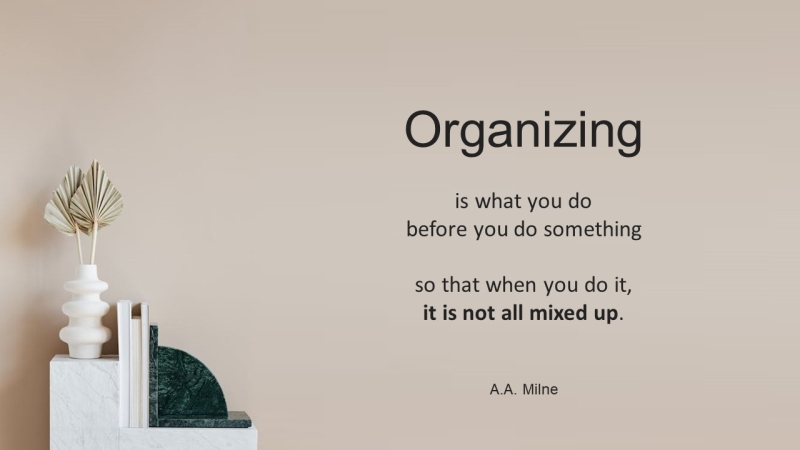WELCOME TO THE WORLD OF ENDLESS POSSIBILITIES! If you’re feeling overwhelmed and disorganized, you’re not alone. It’s easy to get sucked into the chaos and confusion surrounding us in today’s fast-paced world. However, the good news is that you can take control of your life and transform chaos into order. This article will explore the art of organizing and how it can improve your life in ways you never thought possible.
Organizing is the foundation of success in all areas of life. Whether it’s your personal or professional life, being organized is essential for achieving your goals and living a fulfilling life. It’s not just about having a clean and tidy space; organizing goes beyond that. It’s about taking charge of your life and creating a sense of structure and purpose that empowers you to achieve your dreams.
In this article, we’ll examine the benefits of being organized, understand your space, and explore practical tips for decluttering and creating storage solutions. We’ll also discuss how to manage your time and maintain an organized area. By the end of this article, you’ll clearly understand how to transform chaos into order and create a more fulfilling and purposeful life. So, let’s get started!
Benefits of Being Organized
The benefits of being organized are vast and far-reaching, extending beyond a clean, tidy space. When you get your life in order, you’ll experience a significant shift in your perspective and overall well-being. Some of the main benefits of organizing are as follows:
Increased Productivity
When your space is organized, you can focus on the task better. You will only save time searching for misplaced items or feeling overwhelmed by the clutter around you. You’ll be able to work more effectively and complete more tasks in less time if everything is in its proper place.
Reduced Stress and Anxiety
Living in a disorganized space can be incredibly stressful and overwhelming. It’s challenging to relax or concentrate when your environment is chaotic. Creating a clean and organized space instantly makes you feel more relaxed and less anxious. You’ll be able to breathe more efficiently, and your mind will be at ease.
Improved Time Management
Being organized helps you make the most of your time. You can manage your time more effectively by prioritizing tasks and having a clear plan. You won’t feel overburdened by a long to-do list or distracted by the mess around you. Instead, you’ll have a clear vision of what you need to do, and when helping, you make the most of every moment.
Better Mental Clarity
Concentration and clear thinking can be difficult when your surroundings are cluttered. You might find yourself feeling mentally drained and unable to make decisions. On the other hand, an organized space promotes mental clarity and focus. You’ll feel more alert, creative, and productive when your surroundings are organized and clutter-free.
In summary, the benefits of being organized are endless. From increased productivity, reduced stress and anxiety, and improved time management to better mental clarity, creating an organized space can help you live a happier, more fulfilling life.
Understanding Your Space
To create a more organized life, you must first understand your space. This means assessing your current situation, identifying areas of improvement, and setting goals for organizing. Let’s dive into each of these steps.
Assessing Your Current Situation
The first step in understanding your space is to look around and assess your current situation. This means taking note of the areas where you feel disorganized, whether it’s your workspace, home, or schedule. Ask yourself questions like:
-
- What areas of my life feel cluttered or overwhelming?
- Where do I tend to lose things or waste time?
- What activities or tasks tend to cause me stress or anxiety?
By assessing your current situation, you’ll have a clear idea of where to start when organizing your life.
Identifying Areas of Improvement
Once you’ve assessed your current situation, it’s time to identify areas of improvement. This means pinpointing the specific areas where you can make changes to create a more organized and efficient life. For example, if your workspace is cluttered, you might need to create more storage space or implement better filing systems. If your schedule is overwhelming, you might need to prioritize tasks and delegate responsibilities.
Setting Goals for Organizing
With a clear understanding of your current situation and areas of improvement, it’s time to set goals for organizing. These objectives ought to be clear, quantifiable, and doable. For example, place a plan to declutter your workspace by the end of the week or create a weekly schedule that prioritizes your most important tasks.
By setting goals for organizing, you can stay focused and motivated as you work towards creating a more organized and fulfilling life.
Understanding your space is a critical component of organizing. By assessing your current situation, identifying areas of improvement, and setting goals for organizing, you’ll be on your way to creating a more organized and efficient life. Never be afraid to start small and progress to larger goals because small changes can have a significant impact.
Decluttering
Decluttering is a crucial step in the art of organizing. Concentrating and working efficiently can be challenging when your space has too much clutter. Here are some tips for decluttering effectively and creating a more organized life.
Realize the Importance of Decluttering
Decluttering is essential for several reasons. Firstly, it can help you to reduce stress and anxiety. Too much clutter in your space can create a feeling of disorganization and chaos, making it difficult to relax and unwind. Secondly, decluttering can help you to be more productive. A clear and organized space lets you focus more efficiently and get more done. Finally, decluttering can help you to create more space for the things that matter in your life, such as hobbies, relationships, and personal growth.
Implement These Tips for Decluttering Effectively
Decluttering can be daunting, but it doesn’t have to be. Here are some tips for decluttering effectively:
-
- Start small: Begin by decluttering one area of your space at a time, such as a desk or a closet.
- Take it one item at a time: As you’re decluttering, ask yourself if each item is something you need or something that brings you joy. If not, it’s time to let it go.
- Create a system: Decide on a plan for organizing your belongings, such as categorizing them by type or frequency of use.
- Follow the “one in, one out” principle: For every new thing you bring into your space, eliminate something old.
- Be ruthless: Don’t hold onto things out of guilt or obligation. If it’s not serving a purpose in your life, it’s time to let it go.
Donate, Sell, or Throw Away Unwanted Items
Once you’ve decided what to declutter, it’s time to decide what to do with it. Giving unwanted items to charity is one option. Not only does this help others in need, but it can also make you feel good about decluttering. Another option is to sell unwanted items online or at a yard sale. Finally, discard or recycle things if they are no longer usable or valuable.
Decluttering is an essential step in the art of organizing. By reducing stress and anxiety, increasing productivity, and creating more space for the things that matter, decluttering can help you to create a more organized and fulfilling life. Remember to start small, take it one item at a time, and be ruthless in decluttering. By donating, selling, or throwing away unwanted items, you can create a sense of order and clarity in your space that will help you to thrive.
Storage Solutions
Having decluttered your space, it’s time to look at how you can store your remaining belongings effectively. Here are some storage solutions to consider:
Exploring different types of storage options
Storage solutions are available, including shelves, cabinets, drawers, and boxes. Each option has benefits and drawbacks depending on what you need to store.
Choosing the proper storage for your needs
When selecting a storage solution, it’s essential to consider what you need to store and how frequently you need to access it. For instance, a filing cabinet might be your best bet if you have a lot of paperwork. In contrast, a shoe rack or hanging organizer may be more suitable if you have a lot of shoes.
Being creative about storage solutions for small spaces
If you live in a small space, storage can be a challenge. However, there are many creative solutions to help you make the most of your room. Consider using vertical space with wall-mounted shelves, investing in multi-purpose furniture, or utilizing under-bed storage containers.
Remember, the key to adequate storage is finding the proper storage solutions and ensuring you use them effectively. Label your storage bins and group similar items together to make it easy to find what you need when needed.
Time Management Techniques
Every aspect of life requires effective time management. If you struggle with managing your time effectively, it can lead to stress, anxiety, and overwhelming feelings. But with the proper techniques, you can control your time and become more productive.
Prioritizing Tasks
Prioritizing your tasks is one of the most effective time management strategies. This means identifying the most critical tasks and tackling them first. By focusing on the tasks most critical to your goals, you can ensure that you progress daily.
Setting Achievable Goals
Another critical aspect of effective time management is setting achievable goals. You can organize your tasks and work toward your goals when you have specific objectives in mind. But it’s important to set goals that are realistic and achievable. If your plans are too lofty or unrealistic, you may become discouraged and lose motivation.
Creating a Schedule
Finally, creating a schedule is a powerful way to manage your time effectively. You can create a program using a planner, a calendar, or a digital tool like a time management app. When you have a clear plan for spending your time each day, it’s easier to stay on track and avoid distractions.
Remember, time is your most valuable resource. By prioritizing your tasks, setting achievable goals, and creating a schedule, you can make the most of your time and efficiently achieve your goals.
Maintenance and Sustainability
Maintaining a state of being organized is an ongoing process that requires dedication and commitment. After putting in the hard work to declutter, organize, and create a system that works for you, keeping up with it is essential. Here are some tips for maintaining your organized space and making organizing a sustainable habit.
Maintaining Your Organized Space
- Regularly clean and tidy up your space to prevent clutter from building up again.
- Ensure everything has a designated place and return items to their designated spot after use.
- Periodically assess your area and reorganize it as needed.
- Keep up with your filing and paperwork to prevent a backlog from building up.
- Regularly purge items that are no longer required or used.
Sustaining the Maintenance of an Organized Space
- Make organizing a part of your daily routine. Set aside a few minutes daily to tidy up and put things away.
- Stay consistent with your system, and keep clutter from building up.
- Practice mindfulness when acquiring new items. Ask yourself if it is necessary and if it has a designated spot in your space.
- Use eco-friendly and sustainable storage solutions when possible.
- Consider donating or repurposing items instead of throwing them away.
Making Organizing a Habit
- Make a conscious effort to prioritize organization in your life.
- Establish reasonable objectives and divide them into manageable tasks.
- Track your progress and celebrate small victories.
- Make it enjoyable by playing music or getting a friend or family member to help. Don’t beat yourself up for slip-ups; focus on getting back on track.
Following these tips, you can maintain an organized state and make it a sustainable habit. Remember, the benefits of organizing, including increased productivity, reduced stress, and improved mental clarity, are worth the effort. Keep up the excellent work!
Conclusion
Congratulations! You’ve made it to the end of this article on the art of organizing. By now, you should clearly understand the importance of organizing and how it can benefit your life. Let’s quickly recap what we’ve covered:
-
- Organizing your space can increase productivity, reduce stress and anxiety, improve time management, and improve mental clarity.
- Understanding your space is the first step in the process, which involves assessing your current situation, identifying areas of improvement, and setting goals for organizing.
- Decluttering is essential to creating an organized space. There are several practical tips and methods to do so, such as donating, selling, or throwing away unwanted items.
- Different storage options are available, and choosing the solution that meets your needs is essential. In smaller spaces, creative storage solutions can be beneficial.
- Effective time management techniques include prioritizing tasks, setting achievable goals, and creating a schedule.
- Maintaining your organized space is crucial, and implementing sustainable techniques can make organization a habit.
The art of organizing is a powerful tool that can help you succeed in all aspects of your life. By implementing the tips and techniques we’ve covered in this article, you can transform chaos into order and create a space that supports your goals and aspirations.
Remember, organizing is not a one-time task but a habit that needs to be maintained to reap its benefits. So, keep at it and make organizing a part of your life!
Start implementing these techniques today and see their positive impact on your life. Don’t wait.
CLICK THE IMAGE TO LEARN MORE




